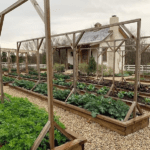Vegetable gardening has seen a surge in popularity in recent years, with more people turning to cultivating their own produce for health, sustainability, and enjoyment. In 2022, the best way to optimize your gardening experience is by utilizing the best vegetable gardening apps available. These innovative tools offer a wide range of features that can help both beginners and seasoned gardeners achieve thriving crops and beautiful harvests.
In today’s fast-paced world, vegetable gardening apps provide a convenient solution for planning, tracking progress, and accessing expert advice at your fingertips. Whether you are starting your first garden or looking to expand your existing knowledge, these apps offer valuable resources that can streamline the gardening process and increase your chances of success. From personalized plant libraries to real-time weather tracking, these apps cater to a variety of needs and skill levels.
One of the key benefits of using vegetable gardening apps is the ability to customize your gardening experience based on your specific needs and preferences. By incorporating features like soil analysis, crop rotation planning, and pest identification, these apps empower users to make informed decisions that can lead to healthier plants and higher yields.
Whether you are a novice gardener looking for guidance or an experienced grower seeking advanced tools, there is a perfect app out there to meet your requirements.
Benefits of Using Vegetable Gardening Apps
Vegetable gardening apps have become essential tools for both novice and experienced gardeners looking to optimize their harvest. These apps offer a wide range of benefits that can significantly enhance the gardening experience. One of the key advantages of using vegetable gardening apps is the ability to plan effectively. With features that allow users to create personalized planting schedules based on their location and preferences, these apps make it easy to stay organized and ensure a successful growing season.
In addition to planning, vegetable gardening apps also excel in tracking progress throughout the planting and harvesting process. By inputting data on plant growth, watering schedules, and any issues encountered, users can monitor their garden’s development in real-time.
This tracking feature not only provides valuable insights into each plant’s health but also facilitates timely interventions if any problems arise. Furthermore, these apps often include expert advice on best practices for specific plants, pest control strategies, and optimal harvesting times.
Moreover, vegetable gardening apps offer a wealth of information at users’ fingertips that can help improve their gardening skills. From detailed plant libraries with growing tips to weather tracking functionalities that assist in adapting to changing conditions, these apps serve as valuable resources for gardeners seeking guidance.
With the right app, users can access expert advice tailored to their specific needs and receive notifications about upcoming tasks or potential issues in their garden. Whether someone is a beginner starting their first container garden or an experienced gardener looking to increase their yield, investing in one of the best vegetable gardening apps 2022 is sure to yield fruitful results.
| Benefits of Using Vegetable Gardening Apps | How They Help |
|---|---|
| Effective Planning | Create personalized planting schedules based on location and preferences |
| Progress Tracking | Monitor plant growth, watering schedules, and identify issues in real-time |
| Expert Advice | Access detailed plant libraries, weather tracking features, and receive customized guidance |
Top Features to Look for in Vegetable Gardening Apps
When it comes to choosing the best vegetable gardening apps for your gardening needs, it’s essential to look out for specific key features that can make your gardening experience more convenient and successful. These features can vary from customizable plant libraries to weather tracking and pest identification tools. By incorporating these elements into your chosen app, you can streamline your gardening tasks, receive expert advice, and ultimately achieve a bountiful harvest.
Customizable Plant Libraries
One essential feature to look for in vegetable gardening apps is a customizable plant library. This feature allows you to input information about the specific plants you are growing in your garden, such as plant type, planting date, watering schedule, and harvest times. By customizing your plant library, you can track the progress of each plant, receive timely reminders for care tasks, and plan your garden layout effectively.
Weather Tracking
Another crucial feature that can greatly benefit vegetable gardeners is weather tracking functionality within the app. Weather plays a significant role in the success of your garden, affecting watering schedules, pest outbreaks, and overall crop health. By having real-time weather updates and forecasts at your fingertips, you can make informed decisions about when to water your plants, protect them from extreme conditions, or adjust your planting schedule accordingly.
Pest Identification
Pest identification tools are also valuable additions to vegetable gardening apps. These tools use image recognition technology to help you identify common pests that may be plaguing your garden. By accurately identifying pests early on, you can take prompt action to control infestations before they cause significant damage to your crops.
Additionally, some apps offer integrated solutions for organic pest control methods or recommend suitable pesticides for specific pests based on eco-friendly practices. Incorporating pest identification tools into your chosen app can help you maintain a healthy and thriving garden throughout the growing season.
By selecting a vegetable gardening app with these key features such as customizable plant libraries, weather tracking capabilities, and pest identification tools for the 2022 growing season will undoubtedly enhance your gardening experience and increase the likelihood of a successful harvest. With these advanced functionalities at your disposal, you can efficiently plan and manage all aspects of your vegetable garden while receiving expert guidance along the way.
Review of the Best Vegetable Gardening Apps for Beginners
Vegetable gardening has seen a significant surge in popularity, with more people looking to grow their own fresh produce. To enhance this experience and help both novice and seasoned gardeners alike, the use of vegetable gardening apps has become increasingly valuable. In 2022, finding the best vegetable gardening apps can make a remarkable difference in planning, tracking progress, and seeking expert advice for a successful harvest.
When diving into the world of vegetable gardening apps, beginners often seek user-friendly platforms with simple interfaces and informative tutorials to guide them along the way. One of the key aspects to consider when selecting an app is its ease of use for those who are just starting their gardening journey.
These apps should offer step-by-step instructions on planting, watering schedules, fertilization needs, and even pest control methods in a clear and concise manner. The accessibility of information can empower beginners to confidently cultivate their own thriving vegetable garden.
In addition to simplicity in design and functionality, beginners benefit greatly from vegetable gardening apps that provide comprehensive plant libraries with detailed information on various vegetables. This feature allows users to select plants that are suitable for their specific climate or growing conditions.
Furthermore, having tutorials on essential topics like soil preparation, sun exposure requirements, and watering techniques can equip beginners with the necessary knowledge to nurture their plants effectively. By choosing user-friendly apps tailored for novices, individuals embarking on their gardening endeavors can build a solid foundation for success.
| Aspect | Detail |
|---|---|
| Key Features | Customizable plant libraries with detailed information |
| Benefit | Tutorials on soil preparation, sun exposure requirements |
Review of the Best Vegetable Gardening Apps for Advanced Gardeners
For advanced gardeners looking to take their vegetable gardening to the next level, there are several high-quality apps available in 2022 that offer advanced features to streamline the process and optimize yields. These apps go beyond basic planning and tracking functions to provide in-depth tools for soil analysis, crop rotation planning, and yield forecasting. Here are some of the best vegetable gardening apps tailored for experienced gardeners:
- Smart Gardener: Smart Gardener is an excellent choice for advanced gardeners looking to maximize their harvest. This app offers soil analysis tools to determine nutrient deficiencies and pH levels, helping users create customized fertilizer plans for optimal plant growth. Additionally, Smart Gardener provides detailed crop rotation suggestions based on previous plantings to maintain soil health and prevent disease buildup.
- Garden Compass: Garden Compass is another top pick for advanced gardeners seeking comprehensive features. This app not only offers detailed plant care information and pest identification but also includes a crop rotation planner to ensure sustainable gardening practices. Users can input their garden layout and previous plantings to receive personalized recommendations for future crops, optimizing yield potential.
- GrowVeg: GrowVeg is a versatile app that caters to both beginner and advanced gardeners with its user-friendly interface and robust features. For experienced gardeners, GrowVeg stands out for its advanced planning tools like custom crop rotation schedules and yield forecasting based on historical data. By analyzing past harvests and planting patterns, users can make informed decisions for future plantings to increase productivity.
These apps empower advanced gardeners with the necessary tools to optimize their vegetable gardens efficiently. From soil analysis to crop rotation planning and yield forecasting, these features help users make data-driven decisions that lead to healthier plants, better harvests, and overall success in vegetable gardening ventures in 2022.
User Tips and Tricks for Maximizing the Use of Vegetable Gardening Apps
Setting Up Customized Notifications
One of the key features of the best vegetable gardening apps in 2022 is the ability to set up customized notifications. By taking advantage of this feature, users can stay on top of their gardening tasks and ensure they don’t miss any important deadlines. Whether it’s time to water a specific plant, add fertilizer, or harvest certain crops, these notifications can be invaluable in keeping your garden thriving.
Utilizing Garden Journals and Notes
Many vegetable gardening apps offer a digital garden journal or note-taking feature that allows users to track their observations, record successes, and learn from failures. By consistently updating your garden journal with details like planting dates, growth progress, pest sightings, and harvest yields, you can create a valuable reference point for future seasons. This data can help you identify patterns, improve your gardening techniques, and ultimately achieve better results year after year.
Engaging With Community Forums and Expert Advice
Another way to maximize the use of vegetable gardening apps is by engaging with community forums and seeking expert advice. Many apps have built-in forums where users can ask questions, share tips, and connect with fellow gardeners.
Additionally, some apps partner with horticulture experts who provide valuable insights on plant care, pest management strategies, and seasonal gardening tips. By actively participating in these discussions and leveraging expert advice, you can expand your knowledge base and take your vegetable garden to the next level.
Comparison of Free vs Paid Vegetable Gardening Apps
When it comes to choosing the best vegetable gardening apps for 2022, one major consideration is whether to opt for a free or paid app. Both types of apps have their own set of pros and cons that gardeners should weigh before making a decision.
Free apps are undoubtedly appealing for their cost-effectiveness, making them accessible to a wider range of users. Many free vegetable gardening apps offer basic features like plant databases, planting calendars, and pest identification tools, which can be sufficient for beginners or hobbyist gardeners.
On the other hand, paid vegetable gardening apps often come with more advanced features and functionalities that can enhance the gardening experience. Paid apps may offer in-depth soil analysis tools, personalized recommendations based on your specific garden conditions, and even options for virtual consultations with gardening experts.
While there is an initial investment required to purchase these apps or subscribe to their services, the benefits they provide in terms of guidance and support throughout the gardening process can outweigh the costs.
For budget-conscious gardeners who are looking for a balance between cost and quality, some vegetable gardening apps offer freemium models where basic features are available for free while additional premium features can be unlocked through in-app purchases or subscription plans. This hybrid approach allows users to access essential tools for free while still having the option to upgrade for more advanced capabilities as needed.
By exploring both free and paid options for vegetable gardening apps in 2022, users can find the right fit based on their specific needs, experience level, and budget constraints.
Conclusion
In conclusion, the world of vegetable gardening has been revolutionized by the advent of technology, specifically through the use of the best vegetable gardening apps 2022. These applications offer a wealth of benefits that can significantly enhance the gardening experience for both beginners and advanced gardeners alike. From planning and tracking progress to accessing expert advice and tips, vegetable gardening apps have become indispensable tools for anyone looking to cultivate a successful garden.
When considering which vegetable gardening app to choose, it is essential to look for key features that will streamline your gardening process. Features like customizable plant libraries, weather tracking, and pest identification can make a significant difference in managing your garden effectively. Additionally, advanced features such as soil analysis, crop rotation planning, and yield forecasting are invaluable tools for experienced gardeners looking to optimize their harvests.
Whether you are just starting on your gardening journey or have been cultivating your plants for years, leveraging the power of vegetable gardening apps can take your skills to new heights. By utilizing these digital tools smartly and incorporating them into your gardening routine, you can enjoy a bountiful harvest while minimizing potential setbacks.
With an array of options available in both free and paid versions, there is undoubtedly a perfect vegetable gardening app out there for every budget and skill level. Embrace technology in your garden today and watch your plants thrive like never before.
Frequently Asked Questions
Is There an App to Help With Gardening?
There are many apps available to help with gardening, catering to different needs and experience levels. From apps that provide information on plant care, watering schedules, pest control, to ones that offer garden design tips and inspiration, there is something for every gardener.
What Is the Best Vegetable Garden Configuration?
The best vegetable garden configuration ultimately depends on various factors such as available space, sunlight exposure, soil quality, and personal preferences. Some gardeners opt for traditional row planting, while others prefer raised beds or square foot gardening for efficient space utilization.
What Is the Best Month to Start a Vegetable Garden?
The best month to start a vegetable garden varies depending on your location and climate zone. In general, starting in the early spring after the last frost date in your area is recommended.
This timing allows plants to establish before the heat of summer or cold of winter arrives. However, some vegetables can be started in late summer for a fall harvest as well.

If you’re looking to get into vegetable gardening, or are just looking for some tips on how to make your current garden better, then you’ve come to the right place! My name is Ethel and I have been gardening for years. In this blog, I’m going to share with you some of my best tips on how to create a successful vegetable garden.





